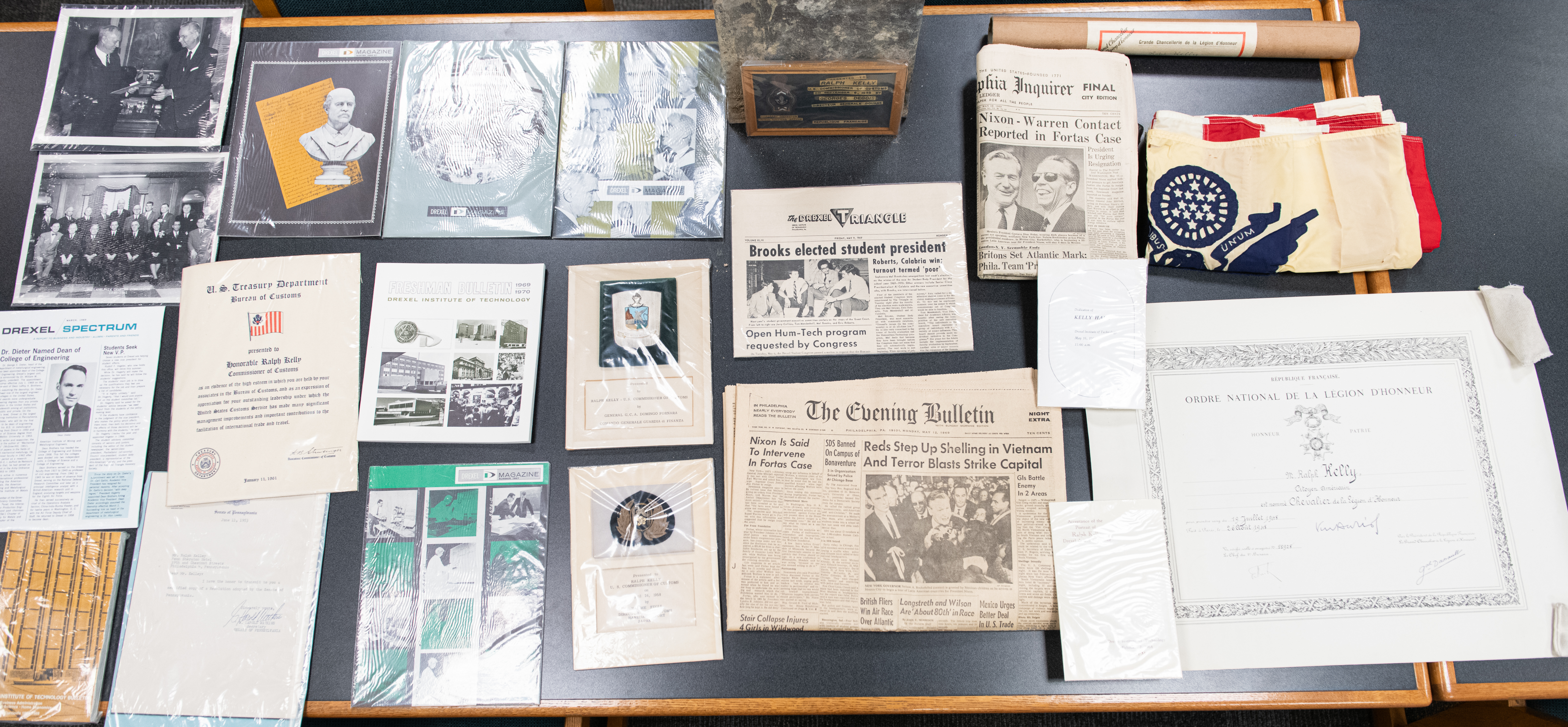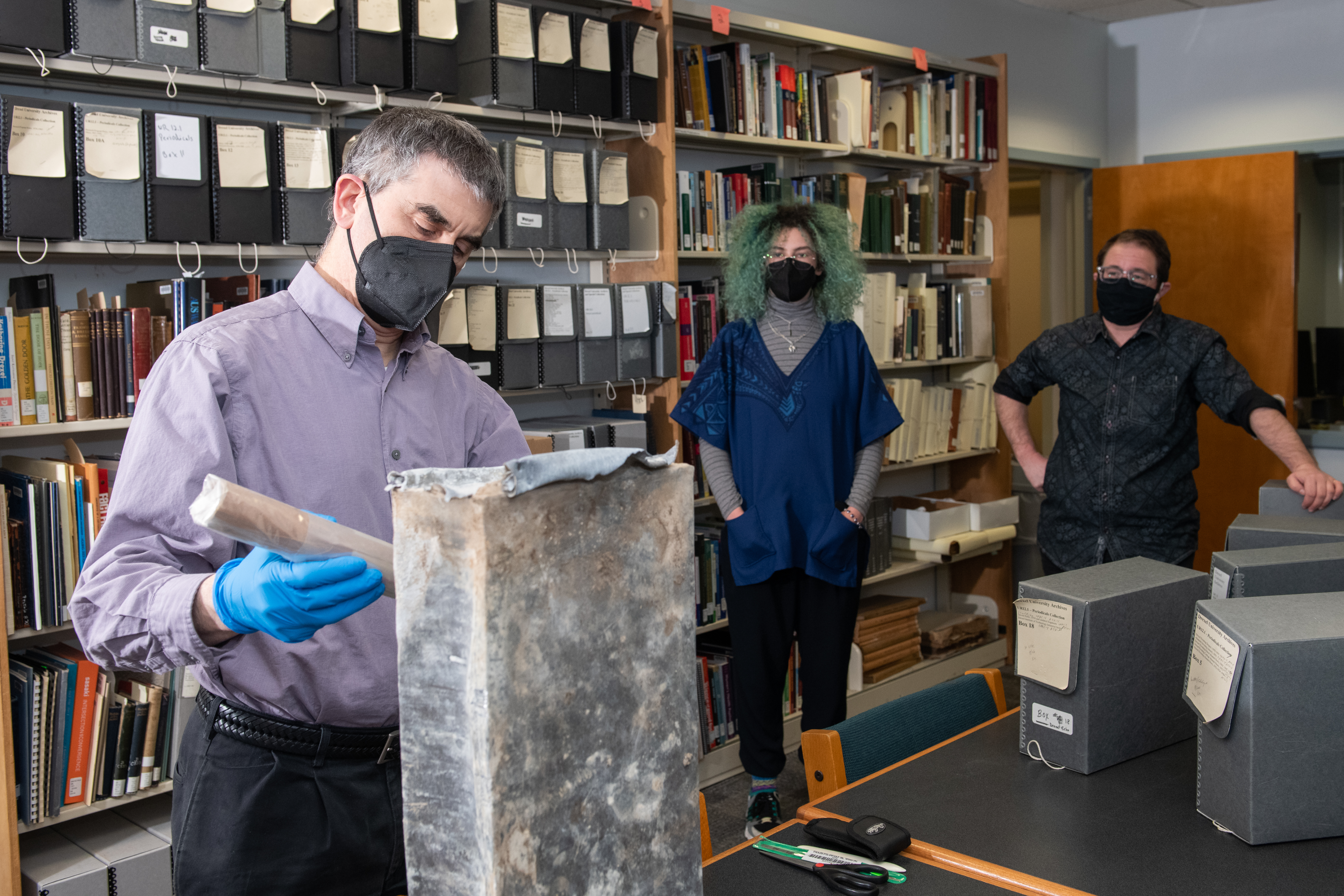Time Capsule Provides Glimpse into Drexel Past
December 7, 2022
During renovations to Kelly Hall in the winter of 2021/2022, staff from Drexel University’s Real Estate and Facilities unearthed an interesting object behind the building’s cornerstone: a time capsule. Coordinating with University Facilities to safely open the lead-sealed box, Drexel University Archives staff successfully opened the time capsule and recovered several documents and objects honoring the residence hall’s namesake, Ralph Kelly.
Based on the contents of the box, Archives staff estimate the time capsule was buried on May 16, 1969, when the building was dedicated to Mr. Kelly. Kelly Hall officially opened its doors in 1967 and was the first men’s dormitory on Drexel’s campus. Drexel archival records indicate that Kelly donated money to the Drexel Institute to build the dormitory, which was later named for him.
 Photo credit: Jaci Downs Photography. Objects from the Kelly Hall time capsule, including newspapers, Drexel publications, photographs, certificates, and a flag.
Photo credit: Jaci Downs Photography. Objects from the Kelly Hall time capsule, including newspapers, Drexel publications, photographs, certificates, and a flag.
The well-preserved items found in the time capsule span from 1948 to 1969 and include photographs, letters, a flag, and several awards Mr. Kelly received, such as unique medals and a certificate from France appointing him a “Knight of the Legion of Honor.”
The time capsule also contained issues of Drexel publications such as Drexel Spectrum and Drexel Magazine (several featuring Ralph Kelly) and 1969 issues of The Triangle (Drexel’s student-run newspaper), The Evening Bulletin, and the Philadelphia Inquirer.
According to University Archives staff, collections such as these often raise as many questions as they answer. Archives Technician Simon Ragovin explained, “We have this… actual [Legion of Honor] document, but… we haven’t corroborated what he received it for…That’s a thread that someone could follow that requires more research.”
 Photo credit: Jaci Downs Photography. University Archives staff open the time capsule. From left to right: Archivist Matthew Lyons, former Archives Co-Op Hanna Pistorius, and Archives Technician Simon Ragovin.
Photo credit: Jaci Downs Photography. University Archives staff open the time capsule. From left to right: Archivist Matthew Lyons, former Archives Co-Op Hanna Pistorius, and Archives Technician Simon Ragovin.
University Archivist Matthew Lyons asserted that objects like this provide a “teachable moment” when it comes to preservation dos and don’ts. The research value of an object is much greater if we have specific information and details linking it to an event, time, or place. In this case, the research value of the time capsule would be greater if the creators had included more detailed information and context for the items included.
“This is just the way archival materials raise questions — [questions which] often require time and effort, and to some extent, serendipity and luck [to answer],” Ragovin added.
Now that the time capsule has been processed, the materials are available for Drexel students, faculty and staff, and members of the general public to explore on their own.
More About Ralph Kelly
Ralph Kelly was a well-known figure both nationally and abroad, having gained a reputation as “a prominent industrialist, civic leader, and civil servant.” Kelly graduated from Harvard in 1909 and went on to serve in prominent roles including Director of First Pennsylvania Bank, Vice President of Westinghouse Electric Corp., President of Baldwin Locomotive Works, and Commissioner of the U.S. Customs Service under President Dwight D. Eisenhower for which he received many accolades, some of which are accounted for in the time capsule.
Kelly died in 1962 and his obituaries boast of his generous donations, including a scholarship fund to Drexel University (then called the Drexel Institute of Technology) that granted scholarships to students “whose homes are more than 20 miles from Philadelphia City Hall.” These scholarships afforded underrepresented groups living outside the City the opportunity to attend Drexel and may indicate Kelly’s interest in equitable education opportunities, especially given the time period.
For more information about the Drexel University Archives, visit www.library.drexel.edu/archives or contact archives@drexel.edu.